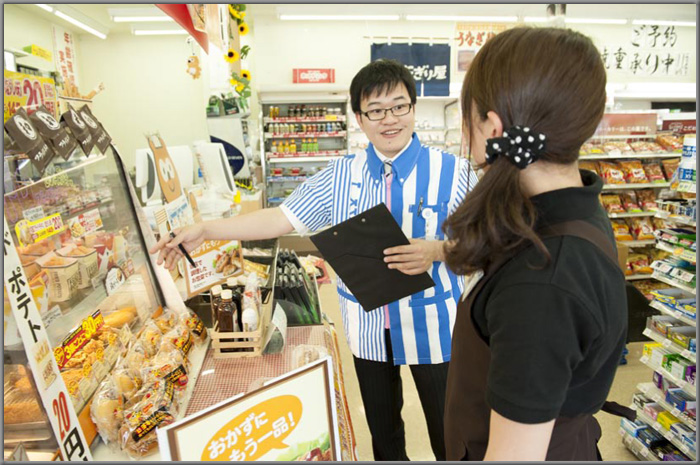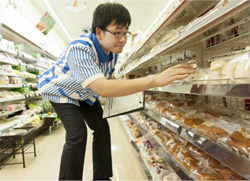Home > Highlighting JAPAN > Highlighting Japan JULY 2012 > Chain Reactions
Highlighting JAPAN
COVER STORY: Nurturing Global Talent

Caption: Nguyen Tuan Duong advises a Japanese manager of the store.
Credit: MASATOSHI SAKAMOTO
Chain Reactions
An increasing number of Japanese companies have been proactively hiring foreign employees in recent years, among them major apparel manufacturer and leading Internet service company. Another notable example is convenience store chain Lawson, as Osamu Sawaji of the Japan Journal reports.

Nguyen performs a stock check.
Credit: MASATOSHI SAKAMOTO
Lawson is a major convenience store operator that runs around 11,000 stores in Japan, about 400 in China, and 32 in Indonesia. The company has been proactive in hiring full-time foreign employees since 2008. The company has made it a policy that around 30% of its newly hired employees are foreign nationals. Out of ninety-eight new hires in FY2012, twenty-one were foreign. To date, the company has hired employees from ten countries and regions, including China, South Korea, Vietnam and Indonesia.
"In order for a corporation to advance further amid the progress in globalization in society, we require employees who are aware of the need to proactively face challenges and who can flexibly respond to issues. To nurture this talent, diversity within a company is extremely important. This is why we are continuously hiring a certain percentage of foreign employees," says Lawson's Senior Vice President Kiyoteru Suzuki. "We do not discriminate just because they are foreign employees."
Foreign employees who work at Lawson are producing extremely good results. Many of those who score among the top in a test given at the end of a new employee training course are foreign employees. In 2009, a Chinese employee secured the top spot in nationwide sales of New Year's osechi ryori dishes.
"There are a number of Chinese employees who have been sent to local subsidiaries in China. They are exercising their leadership skills and are fulfilling the role of managing their local staff," states Suzuki. "The presence of foreign employees also motivates Japanese employees. In the past, only about 5% of Japanese employees wanted to go overseas, but now, 30–40% desire to work abroad."
At Lawson, after completing new employee training, an employee is sent to a store to gain experience as a manager for one to two years, subsequently moves on to become an assistant supervisor (ASV), and then a supervisor (SV). An SV manages the operation of around ten stores and an ASV supports the SV. This career path is basically the same for both Japanese and foreign employees.
"The reason why I came to Japan was because Japanese people are accurate with time and they keep promises. I wanted to adopt this kind of culture," says Nguyen Tuan Duong, who now works as an ASV at a Lawson South Chiba branch in Chiba Prefecture. "And the number of Japanese corporations is increasing in Vietnam; I thought what I learn in Japan would be helpful for my future."
Nguyen was born in Hanoi, Vietnam, and moved to Japan in 2004. After graduating from a Japanese university, he joined Lawson in 2010.
"I thought it would be a waste to go straight back to Vietnam after graduating from university," says Nguyen. "I wanted to work alongside Japanese people and learn how Japanese people work."
One of the reasons Nyugen chose Lawson was because the company is pushing for overseas expansion. Currently as an ASV, while making the daily rounds to his stores, he is acquiring the expertise needed in convenience store operations, by making observations from a customer's perspective and figuring out the best strategy to respond to a customer's needs.
"There are few twenty-four-hour supermarkets or stores that service bill payments for things like electricity and water in Vietnam. If the number of Japanese convenience stores with this type of expertise increases in Vietnam, it will contribute greatly to the Vietnamese economy," Nguyen states. "I would really like to be involved in opening a Lawson store in Vietnam in the future."
© 2009 Cabinet Office, Government of Japan






